To prevent summer brain drain, keep kids engaged with a mix of activities. Set up cozy reading nooks and read together daily. Incorporate math in everyday tasks, like budgeting or cooking. Explore nature with scavenger hunts and encourage kitchen experiments. Balance structured time with free play to foster creativity. Establish routines for consistency, and encourage self-care practices. These strategies not only combat learning loss but also enrich development. There’s much more you can do to support their growth.
Key Takeaways
- Create a cozy reading nook and engage in daily reading sessions to foster literacy and imagination.
- Incorporate math into everyday activities like budgeting, cooking, or playing games to maintain problem-solving skills.
- Encourage outdoor exploration through nature scavenger hunts and simple science experiments to enhance curiosity and learning.
- Balance structured activities with free play, allowing children to explore creativity and social interaction.
- Maintain consistent routines for meals and sleep to support overall emotional and physical well-being during the summer.
Understanding Summer Brain Drain

Understanding summer brain drain is essential, especially since it can greatly impact your child’s academic progress. This phenomenon, often called the “summer slide,” refers to the learning loss that students experience during the summer months.
Research shows that kids typically lose one to two months of learning, especially in math, where losses can reach 2-2.5 months. This effect is more pronounced in low-income students who often lack access to educational resources.
If not addressed, these cumulative losses can lead to significant gaps in knowledge by middle school, widening the achievement gap between socioeconomic groups. Recognizing the challenges of summer brain drain is the first step in preventing it and ensuring your child stays on track academically.
Engaging Reading and Literacy Activities

To combat the summer slide, incorporating engaging reading and literacy activities into your child’s routine can make a significant difference.
Start by creating a cozy reading nook where your child can immerse themselves in books that spark their interest. Try reading together daily, whether it’s a chapter book or fun picture books.
Utilize local libraries for summer reading programs and book clubs that keep them motivated. Encourage creative writing by having them keep a summer journal or write letters to friends.
Engage in storytelling sessions where they can share their own tales. Incorporate educational games that focus on vocabulary and comprehension.
Maintaining Math and Problem-Solving Skills
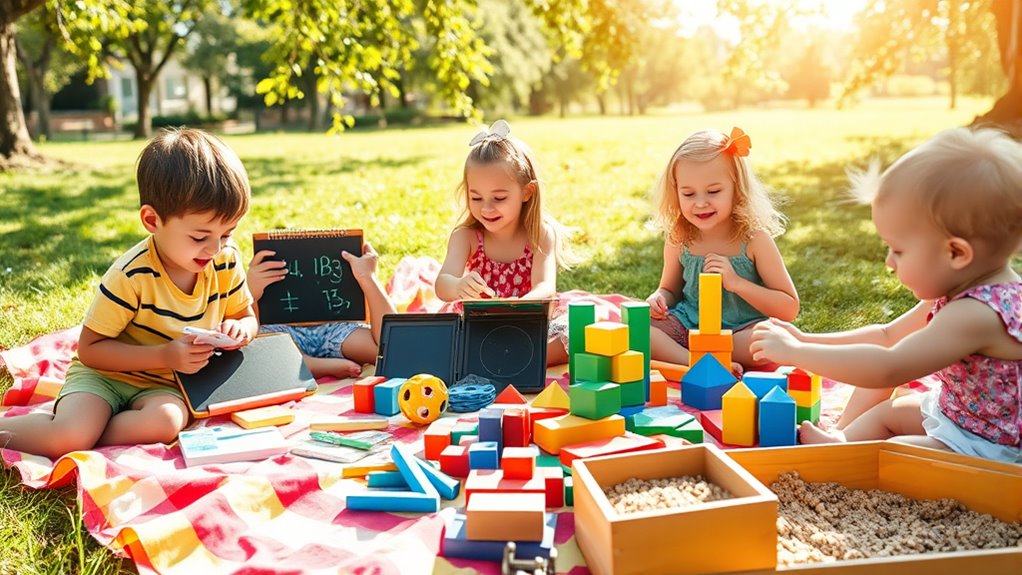
While summer brings a welcome break from routine, it’s essential to keep your child’s math and problem-solving skills sharp during these months. Incorporate math into daily tasks—let them help with budgeting during shopping trips or measuring ingredients while cooking.
Keeping your child’s math skills sharp during summer is crucial—incorporate fun activities into daily routines.
Utilize math workbooks or online resources for engaging activities that make learning fun. Engage your child in math games, like counting money or solving puzzles, to maintain fluency.
When traveling, encourage calculations of distances or time zones to apply math in real-world situations. Set aside a few minutes each day for simple math problems.
These activities not only reinforce skills but also make math enjoyable, ensuring your child stays sharp and ready for the school year ahead.
Exploring Science and the Environment

Mathematics sharpens critical thinking, but exploring science and the environment expands curiosity and awareness about the world around us.
Start by observing nature, prompting questions about plants and animals. Formulate hypotheses—what do you think will happen in your experiments? Conduct simple outdoor tests, like collecting leaves or measuring weather changes.
Engage in kitchen chemistry with fun experiments, like making a volcano with baking soda and vinegar. Building bird feeders can also teach you about diversification in ecosystems as different species interact with varying food sources. Understanding the importance of water sources in various habitats can further enhance your exploration of local ecosystems. Additionally, learning about assisted living expenses can provide insights into how communities support environmental efforts through funding.
Participate in neighborhood clean-ups to understand community responsibility. Use technology for virtual field trips and interactive science apps, enhancing your learning experience. Incorporating STEM toys into these activities can further enhance your understanding of scientific principles.
These activities not only spark interest but also help you develop critical scientific thinking skills.
Fostering Creativity and Arts
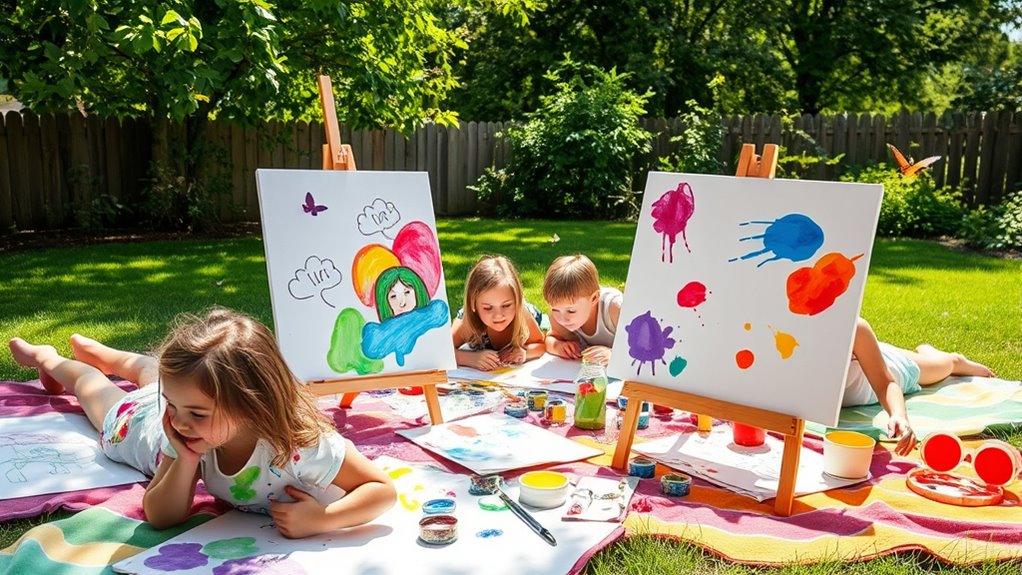
Creativity thrives when children engage with various art forms, allowing them to express themselves and explore new ideas.
Watercolor and acrylic painting invite exploration of colors and techniques, enhancing both fine motor skills and artistic expression. Finger painting offers a tactile experience, while splatter painting encourages dynamic, abstract art. You can take art outdoors, benefiting from natural light and reducing mess. Engaging in these activities can also enhance emotional health, which is crucial for personal development. Additionally, children who engage in imaginative play through these artistic activities often show improved cognitive abilities and problem-solving skills. This is because full sustained attention during these creative processes can significantly enhance the overall quality of their work.
Sculpting with clay or play-dough develops spatial awareness and fine motor skills. Using recycled materials fosters creativity and environmental awareness.
Integrating nature into art, like creating leaf rubbings or outdoor mandalas, promotes mindfulness. Finally, crafting projects such as jewelry, origami, or friendship bracelets not only boosts creativity but also encourages social bonding. Engaging in these activities can also help children develop emotional intelligence that supports their overall growth and interpersonal relationships.
Embrace these activities to nurture your child’s creativity!
Developing Executive Function and Organizational Skills
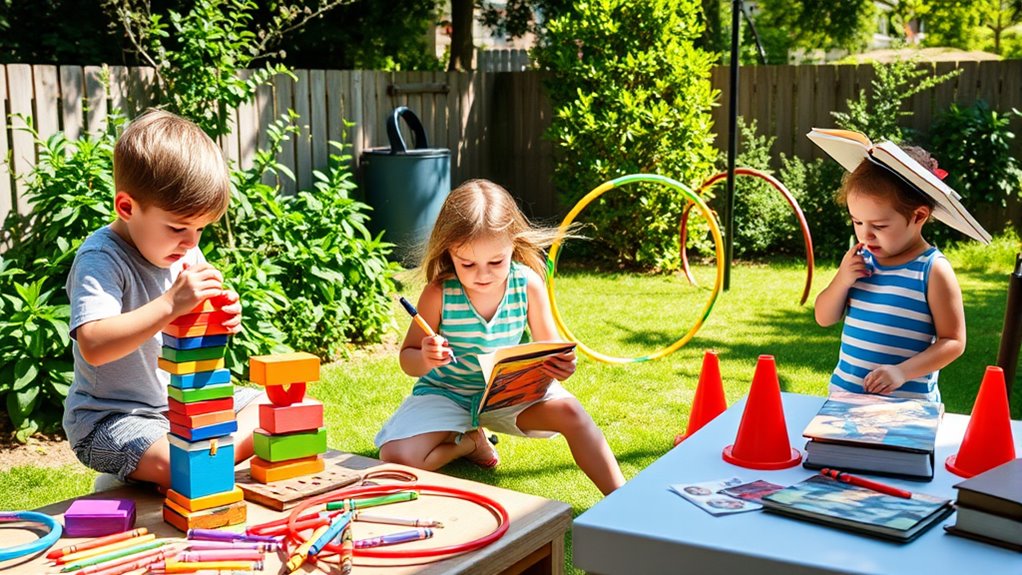
Engaging in creative activities can spark curiosity and imagination, setting the stage for developing other important skills. Executive function skills, like planning and organization, are vital for daily tasks and academic success. For instance, incorporating educational toys can provide hands-on learning experiences that enhance these skills. For children, especially those with ADHD, practicing these skills over the summer can prevent regression. Consider outdoor games or obstacle courses that enhance impulse control and organization. Cooking and baking can develop self-control and math skills, while using Montessori toys can further support sensory development and independent learning. Additionally, providing safe snacks for hamsters can teach children about responsibility and care for pets, reinforcing their organizational skills in a fun way.
Encourage goal setting and scheduling to maintain structure in daily routines. Personal responsibility, like managing chores, boosts organizational skills. Reflecting on successes reinforces learning and motivates further growth. Additionally, incorporating sleep training methods can help children develop a more structured routine, contributing to their overall executive function development.
Building Consistency With a Summer Schedule
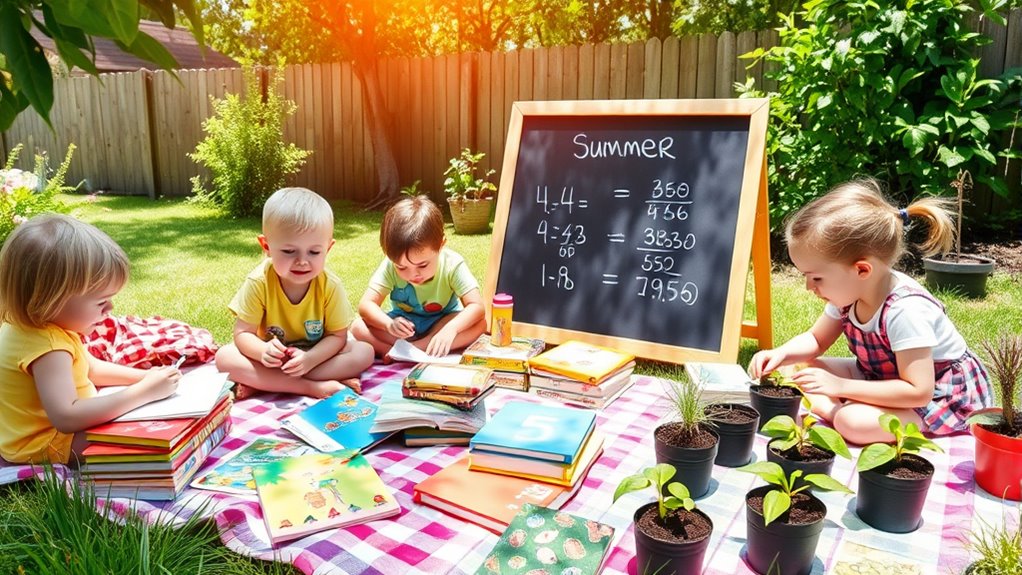
While summer often brings a welcome break from the rigid schedules of the school year, establishing a consistent routine can greatly benefit your child. A structured schedule reduces anxiety, promotes emotional stability, and enhances behavior by providing predictability. Additionally, maintaining a routine during significant changes, like divorce, can help support your child’s emotional health through open communication about feelings. Regular self-reflection can also enhance your child’s self-awareness, leading to better decision-making and emotional intelligence. Consistent routines are vital for emotional and psychological growth in children.
Consistent meal and sleep times are essential for maintaining physical health and well-being.
Establishing consistent meal and sleep times is vital for your child’s physical health and overall well-being.
To build this routine, consider using visual schedules for younger kids or calendars for older children, making it easier for them to understand their day. Balance scheduled activities with free play to support creativity and critical thinking. Make sure your child is involved in creating the schedule, which boosts motivation. By maintaining a flexible yet consistent routine, you’ll help your child thrive throughout the summer months. Additionally, consider incorporating consistent routines that can positively impact your child’s behavior and well-being.
Resources for Summer Learning Activities
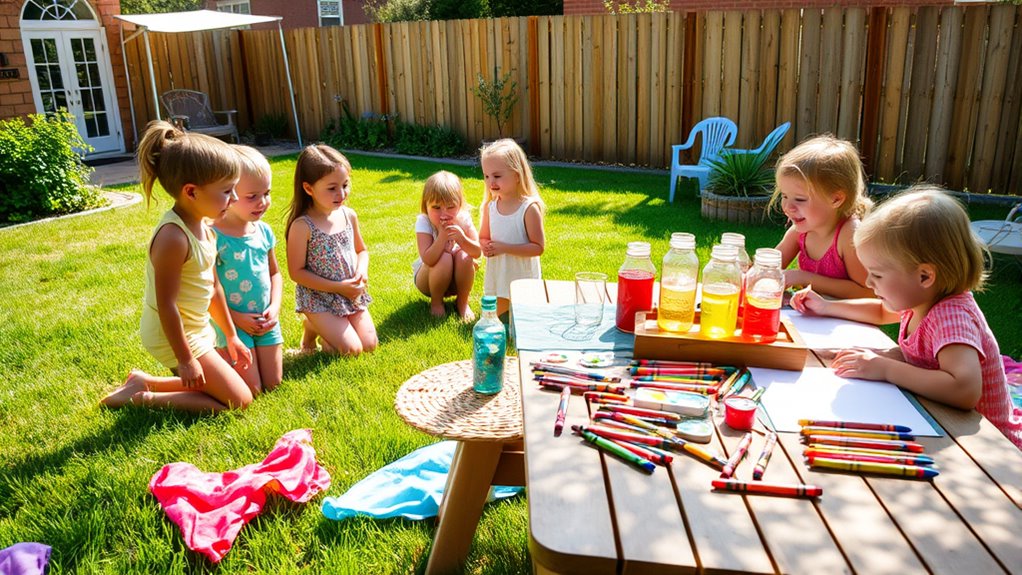
Maintaining a consistent summer schedule sets the stage for productive learning experiences. To enhance your child’s summer, tap into valuable resources.
Educational websites like PBS Learning Media and Khan Academy offer engaging lessons and interactive assignments. WIDEOPENSCHOOL provides daily schedules and virtual field trips, while Scholastic delivers free resources for young learners. Utilizing data analysis can help you identify which subjects your child is most interested in to tailor their summer learning experience.
Encourage reading by joining summer reading programs at local libraries, or track progress with reading charts. For science lovers, try hands-on experiments using household items or explore nature through scavenger hunts.
Don’t forget about outdoor experiences like museum visits, gardening, and community events. Mix in math with cooking or board games to keep learning fun and dynamic. Incorporating self-care practices into your summer routine can also boost your child’s overall well-being and enhance their learning experiences.
This summer, make learning an enjoyable adventure!
Frequently Asked Questions
How Can I Motivate My Child to Participate in Summer Learning Activities?
To motivate your child to participate in summer learning activities, make it fun! Incorporate their interests, like art or cooking, into lessons.
Set up a structured daily routine and use a family calendar to plan exciting activities. Offer choices in reading materials and celebrate their achievements to boost confidence.
Engage in community resources, like summer reading programs or local camps, to keep the experience fresh and enjoyable.
What Is the Best Way to Track My Child’s Progress During Summer?
To track your child’s progress during summer, start by using checklists to mark completed activities.
Create engaging progress charts with stickers to encourage them. Daily journal entries can help monitor writing skills, while a reward system motivates them to reach goals.
Additionally, schedule regular feedback sessions to discuss their achievements. Incorporate reading programs and educational apps, allowing you to easily measure their growth in various subjects throughout the summer.
Are There Specific Apps for Summer Learning Activities?
Imagine your child diving into a treasure chest of knowledge this summer!
There are fantastic apps tailored for learning fun. For reading, try Homer; for math, SplashLearn is a gem. If creativity sparks interest, check out Pixton for comic-making.
CodeSpark Academy introduces coding in an engaging way. Don’t forget Headspace for Kids, which teaches mindfulness.
These apps turn summer into an adventure, keeping your child’s mind active and flourishing!
How Can I Incorporate Learning Into Family Vacations?
To incorporate learning into your family vacations, start by researching your destination’s historical sites and museums. Engage your kids with books about the place before you go, sparking excitement.
Create scavenger hunts during sightseeing to boost observation skills. Use long drives for educational audiobooks, and encourage your children to keep travel journals.
Finally, immerse the family in local cultures through food and crafts, making the trip both fun and educational!
What Are Some Low-Cost Summer Activities for Learning at Home?
You can engage in several low-cost summer activities for learning at home.
Create DIY science experiments with kitchen staples, like baking soda and vinegar. Use free online worksheets to practice math or reading skills.
Organize family reading challenges with library books. Document outdoor adventures in a journal or through nature-inspired artwork.
Host game nights with trivia or educational board games to make learning fun and interactive while spending quality time together.
Conclusion
Summer’s a garden where your child’s mind can flourish, but without nurturing, it risks wilting. By incorporating engaging activities that promote reading, math, science, and creativity, you’re planting seeds for lifelong learning. Establishing a consistent schedule helps grow those seeds into strong roots, ensuring they thrive come fall. So let’s cultivate a summer filled with exploration and fun—your child’s brain will thank you when school starts again, ready to bloom with knowledge and confidence.









